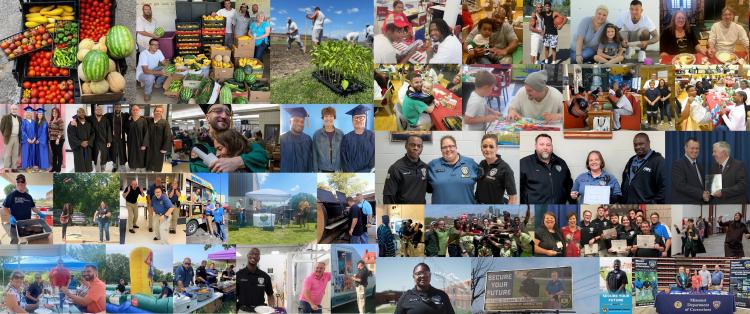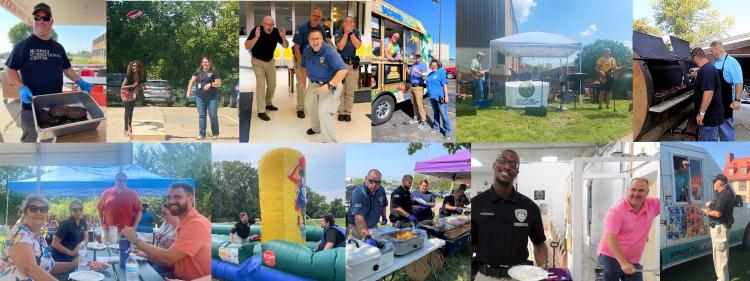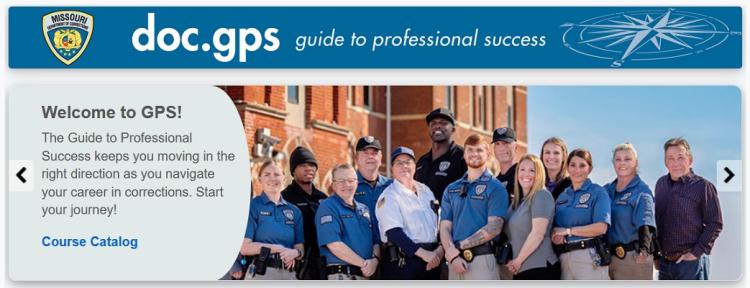
In 2022, the Missouri Department of Corrections launched innovations that helped make life better for teammates, clients, incarcerated Missourians and the communities we serve. We deepened our commitment to staff training, wellness and mental health. We transformed facilities and streamlined services. We educated and inspired people inside and outside our work sites. We even united families. Here are just a few highlights:
1. We earned ANOTHER pay raise.

Missouri continues to invest in our team. Governor Mike Parson proposed and the Missouri General Assembly approved a supplemental budget bill giving all state government workers a 5.5% cost-of-living pay increase and ensuring an annual full-time salary of at least $31,200 for the corrections team. The new pay rate, which went into effect March 1, meant a starting salary increase of 34% for Correctional Officer I positions, 30.4% for office support assistants, and nearly 28% for records officers and district administrators since 2017. Over the last five years, the state has invested $113.7 million in corrections staff pay raises. In addition, the state reinstated and expanded the deferred compensation matching plan to boost staff retirement savings.
2. We fed fellow Missourians.

During the 2022 growing season, Restorative Justice gardens in state prisons yielded 40,927 pounds of fresh produce for donation to community food pantries, nutrition centers and other organizations. In addition to feeding the community, this year Moberly Correctional Center piloted the first offender garden, where volunteers grew fresh fruits and vegetables for peers to purchase in the canteen, with proceeds donated to nonprofits. At Fulton Reception & Diagnostic Center, offender organizations raised $1,643 to help local families affected by the end of the federal universal free school lunch program — enough to wipe out school lunch debt for students at two Fulton schools. Meanwhile, corrections staff events held in support of the Missouri State Employee Charitable Campaign (MSECC) raised money for the Food Bank for Central and Northeast Missouri. Corrections staff donations to MSECC totaled $122,646 — more than any other state agency.
3. We got crafty for the community.

Through Restorative Justice programs that help incarcerated Missourians give back, offenders channeled their artistic skills into projects that benefit nonprofit organizations —through donation to recipients or fundraising auctions. Incarcerated craftspeople throughout the state created 55 Special Olympics trophies; 12,721 sewing and crocheting projects; 520 quilts, blankets and afghans; 487 woodworking projects; 253 paintings and murals; 10,543 sets of KidSmart educational materials; and 1,115 miscellaneous projects. In addition, offender-led fundraisers generated more than $17,050 in monetary donations. The more than 160 recipient organizations serve Missourians in areas such as education, child development, elder care, mental health, emergency shelter, crime prevention and more.
4. We saved lives.

Courageous staff members earned the department’s Lifesaver Award for acts of heroism such as protecting teammates during assaults, intervening in fights to stop injuries to offenders, recognizing staff health emergencies and alerting medical teams, rendering aid to choking victims, and taking other lifesaving measures to help offenders, staff and visitors. Governor Mike Parson presented Division of Adult Institutions Director Travis Terry with the statewide Public Safety Civilian Partnership Award for an off-duty act of courage after Terry and a fellow passer-by stopped to help a sheriff’s deputy struggling with a suspect on the side of a state highway, intervening just in time to prevent the suspect from seizing the officer’s weapon.
5. We opened a transition center.

On April 1, clients began moving into the newly renovated Transition Center of Kansas City (TCKC), a residential probation and parole facility equipped with housing for 150 clients and workspace for 106 staff, as well as classrooms, computer labs, a professional-attire lending closet, programming space and more. Instead of going home to old habits, Kansas City-area clients work with reentry professionals on building a new mindset and the foundation for a better life in a tiered, four-phase program. TCKC partners with more than 50 organizations offering holistic reentry services, behavioral health treatment, financial services, employment and job training.
6. We reopened a correctional center.

Thanks to a decline in Missouri’s prison population, in 2022 the department was able to transfer operations from Western Missouri Correctional Center (WMCC) to Crossroads Correctional Center (CRCC), which had been offline since 2019. A smaller and more modern facility, CRCC provides for better staffing coverage, helping to reduce the strain on corrections professionals working in the facility. In advance of the move, CRCC held a family day so staff members’ loved ones could tour the facility. As we enter 2022, we’re converting WMCC into a training center, where staff can get hands-on experience in an environment that mirrors their future worksites.
7. We invested in infrastructure.

In 2022, the department initiated projects that shore up our facilities, tools and equipment. These undertakings include preventative maintenance contracts for major operating systems; replacement of radios, cameras and video storage systems; broadband expansion for all prisons; water and wastewater infrastructure upgrades; and capital improvement projects for repair and maintenance of roofs, windows, concrete, asphalt, HVAC systems and more.
8. We equipped officers for success in the field.

The Division of Probation & Parole empowered officers to more comprehensively manage their own clients, while alleviating the strain on local law enforcement. In the Arrest Team program, probation and parole officers took classes with university police academy trainers, building skills needed to make safe arrests. In late 2021 and early 2022, training was extended to two more regions, and an additional 48 officers joined the arrest team. Since the program’s 2020 inception, 727 arrests have been made, with 577 of them taking place in 2022. On nine occasions, controlled substances were seized and turned over to police.
9. We brought families together.

Two mid-Missouri prisons launched honor visits in 2022, giving qualifying residents of Algoa Correctional Center (ACC) and Moberly Correctional Center (MCC) the opportunity to visit with their families inside the facilities’ recreation yards or gym, where they could share meals, play games with their kids, take walks in the sun and reconnect as a family – outside the confines of the visiting room. ACC’s Family Restoration Visits are part of the Honor Status program that launched in April with the opening of an honor dorm housing 92 men selected for their conduct and commitment to personal development. MCC’s Family Forward visits grew from a recommendation by an offender innovation council participating in the grant-funded Prison Research and Innovation Network (PRIN), which works to improve the lives of people working or living in prisons through research-based innovations. The programs incentivize pro-social behaviors, motivating more offenders to strive for eligibility; after the ACC program was established, conduct violations facility-wide dropped by more than 1,000 compared to the same time last year. In addition, Boonville Correctional Center (BCC) continued its Empowering Dads Embracing Fatherhood program, in which kids get to spend one-on-one time with their dads on special visit days, and this year BCC offenders held a fundraiser to help support it.
10. We educated more Missourians.

While the federal government expanded the Second Chance Pell program to give more incarcerated students access to higher education, the Missouri Department of Corrections forged partnerships, grew programs and launched apprenticeships. Central Methodist University started associate’s degree programs at three facilities, and Lincoln University launched a bachelor’s degree program at another — adding to the half-dozen higher-education partnerships already in place. In vocational education, we launched new telecommunications and HVAC programs and laid the groundwork for the state’s first tattoo practitioner apprenticeship. In fiscal year 2022, the department had an average of 2,445 students enrolled in academic programs each month, with a high school equivalency pass rate of 99.8%. About 250 students were enrolled in career and tech education programs each month, earning 603 professional certificates. In addition, more than 700 students were enrolled in higher education courses each semester.
11. We hosted celebrity visits.

In 2022, TV stars, artists, musicians, chefs, motivational speakers and other celebrities visited Missouri Department of Corrections facilities to inspire offenders and staff. Reality TV star Duane Chapman, aka Dog the Bounty Hunter, who spent time in Texas prisons, spoke to offenders at Western Missouri Correctional Center (WMCC) as part of an Expected End Ministries tour. Top-rated celebrity chef, restaurateur and author Keith Corbin, who spent a decade in California prisons, visited Transition Center of Kansas City (TCKC) residents to share his story and his memoir, California Soul: An American Epic of Cooking and Survival, with men on probation and parole. Howard University College of Medicine professor and endocrinologist Dr. Stan Andrisse, a former Missouri offender, shared his story and memoir, From Prison Cells to PhD: It Is Never Too Late to Do Good, with Transition Center of St. Louis residents. United Nations art ambassador Ibiyinka Alao, a world-renowned Nigerian artist, gave a presentation at Jefferson City Correctional Center (JCCC), led offender-artists in an art therapy workshop and met with JCCC staff from Nigeria and other West African countries; he also presented to staff and community partners at the ARCHS Missouri Reentry Conference. Motivational Speaker and former Missouri offender Ricky Johnson Jr. led workshops at Eastern Reception, Diagnostic & Correctional Center (ERDCC) and Missouri Eastern Correctional Center (MECC).
12. We showed more love for our staff.

Supplementing awards ceremonies and other events designed to honor staff, this year admin teams went all out for Corrections Employee Appreciation Week in September. Staff at worksites throughout the state held special events designed to build bonds among teams and show appreciation for colleagues. Food was a big draw; worksites served breakfast, hosted cookouts, and invited food trucks and ice cream trucks to their locations. Games took center stage at many facilities, with competitive cornhole and ring toss tournaments pitting teammates against one another. Some sites went into full carnival mode, covering their grounds with giant inflatables. Other highlights included backyard concerts, T-shirt and dress-down days, wellness walks, craft fairs, pie-in-the-face events, and even a more formal challenge coin presentation respectfully recognizing top-performing staff.
13. We modernized our training systems.

In 2022, the department launched a new learning management system designed to streamline staff training and development. Called the Department of Corrections Guide to Professional Success, or DOC.GPS, the system serves as an innovative, automated tool for managing in-seat and online training. Staff can access a monitoring dashboard, view their own training records, and receive notifications when training has been completed or is overdue. Through DOC.GPS, staff also can track their own progress, browse elective offerings, complete surveys, print certificates and connect directly with MO Learning. A course catalog, learning paths and announcements tailored to each staff member's training needs help guide learners toward career success.
14. We made new strides in mental health.

The department deepened our commitment to supporting staff wellness and addressing staff trauma. In May and October 2022, we held the first two session of the Post Critical Incident Seminar (PCIS), a three-day intensively focused therapeutic event designed to help corrections staff experiencing traumatic stress following involvement in a serious incident. Participants rated the event 9.4 on a 10-point scale and credited the experience with changing, or even saving, their lives. We launched the first phase of the nation’s first corrections-based Zero Suicide initiative, a framework used to create a culture of safer suicide care and reduce the number of suicides. We held Critical Incident Stress Management (CISM) training using the International Critical Incident Stress Foundation model, ensuring every part of the state has a CISM-trained corrections professional ready to help staff in a crisis. At Moberly Correctional Center, we also created a staff decompression space, a designated area where staff can collect themselves after a traumatic event, unwind after a long shift, or take care of their personal needs during overtime shifts or inclement weather.
15. We expanded recruitment and retention.

After overhauling staff recruitment in 2021, we revved up our efforts this year, with statewide multifaceted multimedia ad campaigns; popup job booths; extension of the staff recruitment incentive payment to additional job types and part-time positions; and a statewide Recruiting the Future recruitment and retention competition that ended with three facilities staffed at 100%. The efforts paid off. Between January and November, monthly correctional officer applications increased by more than 200%, and 2022 total new hires exceeded the 2021 total by 23%.
16. We paraded through Missouri streets.

To both celebrate our presence in local communities and invite more Missourians to join our team, this year corrections staff marched in parades throughout the state. Corrections Emergency Response Team (C.E.R.T.) members, search-dog teams and staff from Farmington and Potosi took part in the 2022 Farmington Regional Chamber of Commerce Country Days Parade and, joined by Potosi Puppies for Parole, the Austin Moses Parade. The Western Region Honor Guard and the Chillicothe Correctional Center C.E.R.T. represented in the Chillicothe Home of Sliced Bread Parade. Women’s Eastern Reception, Diagnostic & Correctional Center staff rode in the Vandalia Lighted Christmas Parade. Southeast Correctional Center team members took part in Sikeston's Dashing through Downtown Parade of Lights. Fulton staff joined fellow first responders in the Fulton Emergency Vehicle Parade and Shop With a Hero event. Team members from Missouri Eastern, Northeast and Western Missouri correctional centers, as well as Central Office, joined forces in a show of support for the community and our staff in the St. Louis Grand Pride Parade. And on a smaller scale, staff and offenders at Missouri Eastern Correctional Center held an on-site breast cancer walk to support cancer survivors and their families.
17. We measurably boosted staff morale.

Our much-needed focus on staff got results. Developed to provide a better understanding of organizational health, the quarterly pulse survey (QPS) completed by state employees monitors state agencies' efforts to make improvements. Since 2018, the Missouri Department of Corrections has experienced a higher rate of improvement than any other state agency in nearly every QPS category, and survey results show overall gains of 16-21% in areas such as direction, leadership, accountability, motivation and external orientation. In some areas, such as strategic clarity and supportive leadership, improvements were as high as 46%. Between 2021 and 2022, results continued to improve in all areas, including accountability (up 2%), external orientation (up 4%) and motivation (up 6%).
18. We adopted a new mail procedure.

In 2022 we took steps to help streamline mail delivery and shut down one pipeline for dangerous contraband. Offender personal postal mail is now sent to a mail processing center. There, the mail is digitally scanned and delivered electronically to offenders’ media players. This new procedure helps to prevent drugs and other dangerous contraband from entering facilities through personal mail. It helps reduce the workload and potential danger of exposure for mailroom staff. It also streamlines the mail delivery service; correspondence is delivered directly to the recipient, even during transfers.
19. We stepped up substance use recovery services.

As drug use and opioid overdose deaths skyrocket in communities throughout Missouri, the Department of Corrections addressed addiction, the demand for drugs and harm mitigation. In 2022, we bolstered Medication Assisted Treatment (M.A.T.). We expanded naloxone (Narcan) access and revised procedures to help reverse overdoses and prevent deaths. To streamline delivery of substance use recovery services for offenders, we extended our contract with longtime service provider Gateway Foundation to all facilities, helping to ensure consistency in programming and more efficient management of operations and resources.
20. We readied Missourians for tech jobs.

In 2022, two new classes graduated from JusTech, a LaunchCode program preparing incarcerated Missourians for post-release jobs in the tech industry. Before release, students learn computer programming, web development and project development. After release, they’re eligible for apprenticeships with area employers. The winter Algoa Correctional Center graduation ceremony marked the third class to complete the program, after successful stints at Potosi Correctional Center and Missouri Eastern Correctional Center. LaunchCoders from the first class already are running a tech nonprofit.
21. We readied rescue dogs for forever homes.

Dog handlers in the Puppies for Parole program trained and socialized more than 500 rescue dogs for adoption and completed 60 apprenticeships, and donors contributed more than $28,500 to the program. This year P4P participants not only taught their charges how to be good citizens but also learned how to care for dogs in an emergency. Ozark Correctional Center and Boonville Correctional Center handlers completed Pet First Aid and CPR training, earning certifications they can use after release. Meanwhile, P4P alumni took big steps. Dog trainer Trey Dawson generated a buzz and professional success with his Columbia business, Backyard K9s. Trainer William Smith’s release from Missouri Eastern Correctional Center coincided with his trainee’s adoption day by a family member; Smith and Slider were able to go home together.
22. We became international role models.

All year team members were invited to conferences, meetings and collaborations throughout the United States to share insights and successes with fellow corrections professionals. We also garnered worldwide attention when the multilingual, international criminal justice publication Justice Trends magazine highlighted MODOC accomplishments with the cover story "The Staff at the Heart of the Missouri Corrections Culture Transformation." The piece describes how creating a better environment using tools such as The Corrections Way yields not only better workplaces but also safer communities.
